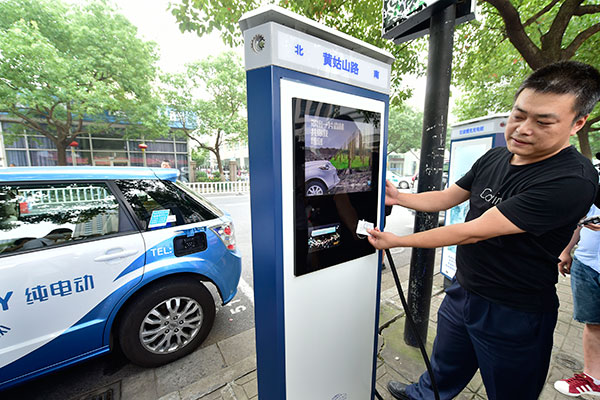
A driver swipes a card to pay for charging his electric car. Standards are being revised for the sector and are expected to cover charging posts and electric vehicle sockets, enabling new-energy cars from different marques to share charging posts. (Li Zhong / For China Daily)
National standards expected to allow different models to share charging infrastructure
Electric vehicles from different manufacturers in China should soon be able to share charging facilities as the country is expected to release new charging standards soon.
"The revisions are finished and will be released in August," Xu Xinchao, an official at Beijing's science commission, told reporters in late July.
Xu said the revised standards will cover charging posts and electric vehicle sockets, adding they would enable new-energy cars from different models to share charging posts.
China's current national standards for charging involve general matters such as interfaces but do not cover such specific parameters as charging facilities or electric car voltages and power capacity.
Due to the lack of national standards in those aspects, some vehicles cannot get a full charge from the charging facilities of other manufacturers, a salesman at Denza, a joint venture between BYD and Daimler, told Beijing Business Today.
Tesla owners have even bigger problems with charging as the automaker uses US standards for their facilities in China. That means Tesla cars cannot recharge at public charging facilities in China and electric vehicles from other manufacturers cannot use Tesla's charging posts.
Many brands including Tesla said they would make adjustments to their vehicles and charging infrastructure when the revised national standards are released.
Industry insiders believe the new standards will promote the popularity of new-energy vehicles in the country, as mileage anxiety remains one of the biggest headaches for people who own or plan to purchase electric vehicles in China.
"The revised national standards will help ease people's worries about charging their cars and sales of new-energy vehicles will see rapid growth when the standards are in place," said Beijing-based independent auto analyst Zhang Zhiyong.
New-energy vehicles are already gaining momentum in China. Statistics from the China Association of Automobile Manufacturers show that China sold 21,055 such vehicles in June, more than double the figure of a year earlier.
Sales of new-energy vehicles in the first half hit 72,711 units, a 240 percent rise from the same period last year. Of those, 64 percent were pure electric vehicles.
China plans to have 5 million such vehicles on its roads by 2020. The sector of new-energy vehicles is also a priority in the Made in China 2025 strategy the State Council released in June.
Many local governments are planning to expand their charging networks as part of efforts to promote new-energy vehicles.
Beijing announced it would install charging posts within a five-kilometer radius inside the sixth ring road by the end of this year.
Statistics show the city government has built about 1,700 charging posts in the capital.
Xu at the city's science commission said the government would gradually stop building new charging facilities and called for private funds to play a bigger role in the charging infrastructure.
According to the National Energy Administration, China is expected to have 4.5 million charging posts by 2020, at a cost of more than 124 billion yuan ($20 billion).
In addition to government efforts, some automakers are installing charging posts for their customers. The first of those built by Beijing Automotive Industry Corp went into use in May.
A growing number of companies dedicated to installing charging infrastructure is emerging in the market, with the first joint venture in the sector established in July.
Zhang predicted that the new standards would also be good news for those companies as charging facilities would become easier to promote when they can charge vehicles from different models.


















































